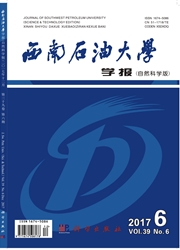

 中文摘要:
中文摘要:
川西新场气田须二气藏为典型的低渗致密碎屑岩气藏,由于地质条件复杂,储层非均质性严重,气水分布十分复杂,束缚水含量较高,气层、气水同层电阻率界限模糊不清,测井解释往往造成很大误判。针对这一难点,应用基于粒子群算法(PSO)的核主成分分析与支持向量机(KPCA-SVM)模型进行气水层识别。模型先通过核主成分分析(KPCA)进行非线性属性变量提取,再将提取的属性变量作为支持向量机(SVM)的输入变量,在识别过程中利用粒子群算法(PSO)寻优,最终实现气水层识别。将模型应用于新场气田须二气藏气水层识别,识别结果符合研究区的实际情况。
 英文摘要:
英文摘要:
Xu 2 Gas Reservoir,which is in Xinchang Gas Field in western Sichuan Basin,is a typical low-permeability and tight clastic gas reservoir. Due to the complicated geological conditions and serious heterogeneity in this area,the gas-water layer distribution is very complicated,and the bound water’s content is high. The boundaries of resistivity between gas reservoir and gas-water layer are blurred,so that some mistakes arise in log interpretation. We use kernel principal component analysis and support vector machine,also known as KPCA-SVM model,which is based on particle swarm optimization(PSO),to solve the problem. Firstly,the model extracts non-linear properties of variables by kernel principal component analysis(KPCA), and then inputs the properties of a variable into the support vector machine(SVM). And in the identification process,we use the particle swarm optimization(PSO)to seek the optimization algorithm. Finally,the gas-water layer identification is implemented in the SVM. We applied this model to gas&water layer prediction of Xu 2 Member gas reservoir of Xinchang Gas Field,and the recognition result is in line with the actual situation of the study area.
 同期刊论文项目
同期刊论文项目
 同项目期刊论文
同项目期刊论文
 期刊信息
期刊信息
